'Stansted 15' win appeal against conviction for deportation flight protest
- Published
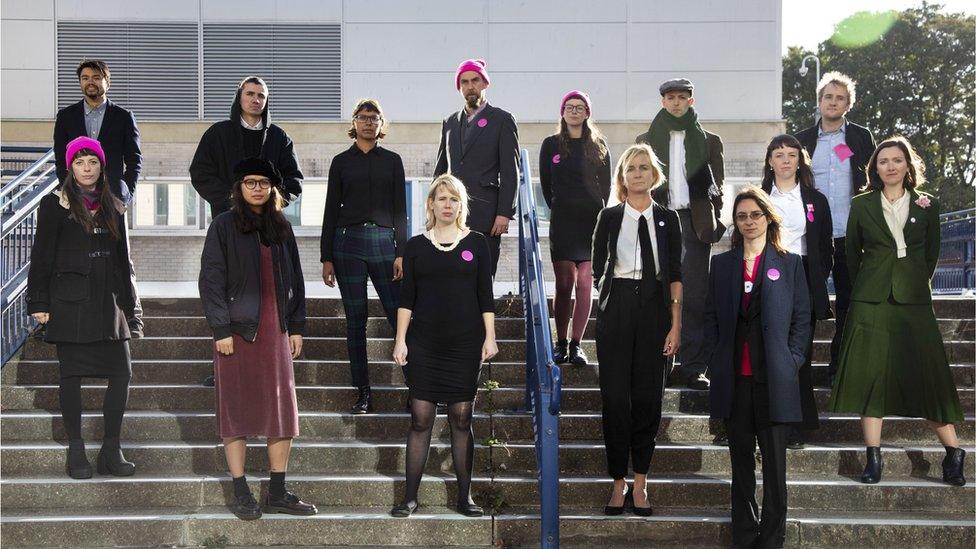
The "Stansted 15" tried to stop an aircraft being used to deport people to Africa (one of the 15 did not make the photo call in time)
Protesters who broke into Stansted Airport to stop a plane deporting people to Africa have won an appeal against their convictions.
The group, known as the Stansted 15, cut through the perimeter fence and locked themselves together around a Boeing 767 jet in 2017.
They were convicted of the intentional disruption of services at an aerodrome.
The Lord Chief Justice said they "should not have been prosecuted for the extremely serious offence".
A spokesman for the Crown Prosecution Service said: "We will consider the judgment carefully in the next 28 days."
The jet they surrounded in March 2017 had been chartered by the Home Office to transport people from UK detention centres for repatriation to Nigeria, Ghana and Sierra Leone.
The protesters put their arms inside pipes which were then filled with expandable foam, and secured themselves around the nose wheel and wing of the aircraft, the court was told during their trial.
They were convicted under the Aviation and Maritime Security Act (Amsa) 1990.
In February 2019, three were given suspended jail sentences, and the other 12 were handed community orders.
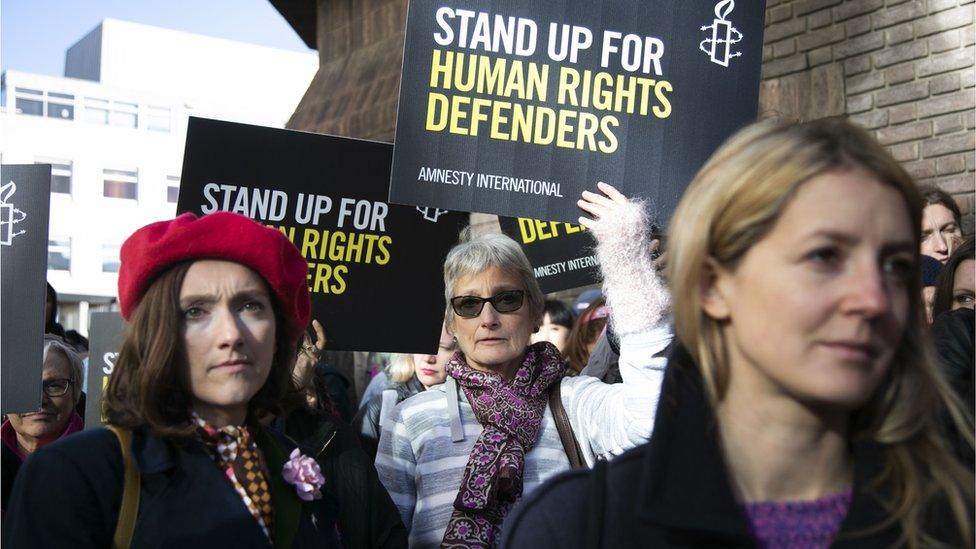
Amnesty International placards were held up outside Chelmsford Crown Court during the trial
Sitting with Mr Justice Jay and Mrs Justice Whipple, Lord Burnett said the protesters' "conduct did not satisfy the various elements of the offence".
"There was, in truth, no case to answer," he said.
"We recognise that the various summary-only offences with which the appellants were originally charged, if proved, might well not reflect the gravity of their actions.
"That, however, does not allow the use of an offence which aims at conduct of a different nature.
"All the appellants' convictions must be quashed."
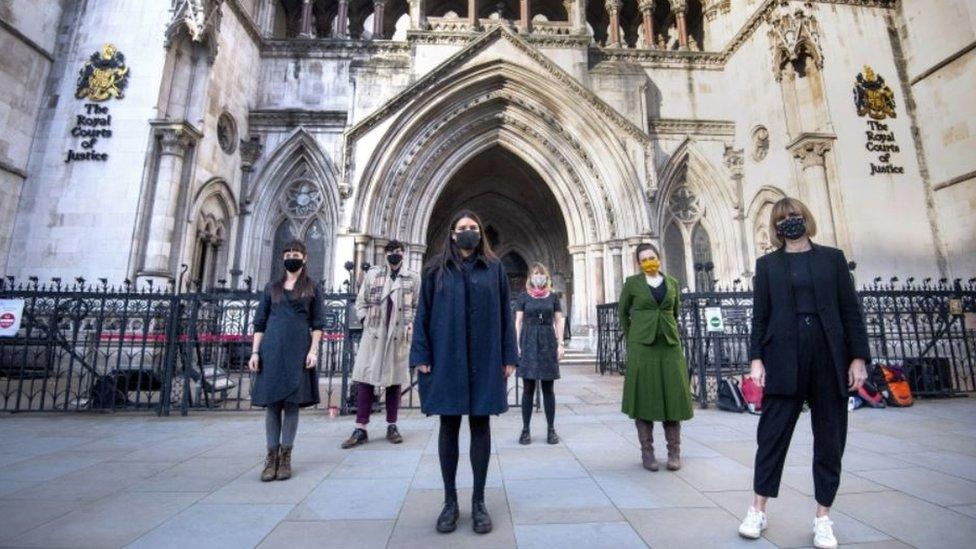
Six members of the "Stansted 15" were photographed outside the court on the first day of the appeal hearing
At the appeal hearing in November, lawyers for the activists argued the legislation used to convict the 15 is rarely used and not intended for this type of case.
The Stansted 15's barristers argued that the Amsa law is intended to deal with violence of the "utmost seriousness", such as terrorism, not demonstrators.
Lord Burnett said in the judgement that it could not be established on the evidence in the case that the group's actions caused disruption which was "likely to endanger" the safe operation of the airport or the safety of people there.
After the judgment was published, one of the protesters, Lyndsay Burtonshaw, tweeted: "We got the judgement from our appeal for our terrorism-related conviction for the #Stansted15 action. WE WON!"

Analysis by Dominic Casciani, BBC News Home and Legal Correspondent
The Court of Appeal's judgment in favour of the 15 underlines a fundamental safeguard in the law: You can only be prosecuted for something you've actually done - and that means the evidence has to fit the wording of the offence.
The crime the 15 were charged with had its genesis in the need to protect airports from terrorism - yet the prosecution didn't suggest at the trial that the incident was remotely that kind of attack.
And the protesters insisted that despite their plan to stop the flight, they never intended to do anything that was likely to endanger safety at the airport. The three senior judges agreed that this critical test had not been met and so the prosecution was unjustified. The 15 may have created a health-and-safety risk by going onto the airport tarmac - but that was well below a genuinely dangerous situation that would have justified charging them with this very serious offence.

'Our actions were justified'
In a statement on behalf of the group, May MacKeith, one of the protesters, said: "The nightmare of this bogus charge, a 10-week trial and the threat of prison has dominated our lives for four years.
"Despite the draconian response we know our actions were justified.
"Eleven people, including survivors of trafficking, who would have been deported that night are still in the UK.
"Mothers, fathers, colleagues, friends and family members are rebuilding lives the Government attempted to destroy."
The 15 are: Helen Brewer, 31; Lyndsay Burtonshaw, 30; Nathan Clack, 32; Laura Clayson, 30; Melanie Evans, 37; Joseph McGahan, 37; Benjamin Smoke, 29; Jyotsna Ram, 35; Nicholas Sigsworth, 31; Melanie Strickland, 37; Alistair Tamlit, 32; Edward Thacker, 31; Emma Hughes, 40; May MacKeith, 35; and Ruth Potts, 46.

Find BBC News: East of England on Facebook, external, Instagram, external and Twitter, external. If you have a story suggestion email eastofenglandnews@bbc.co.uk, external
Related topics
- Published24 November 2020

- Published22 August 2019

- Published8 January 2019

- Published10 December 2018
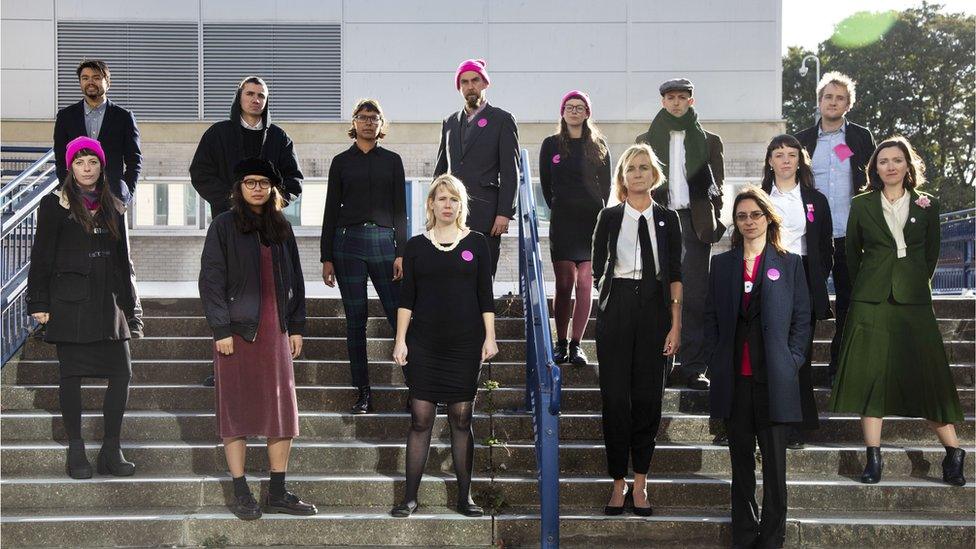
- Published6 November 2018
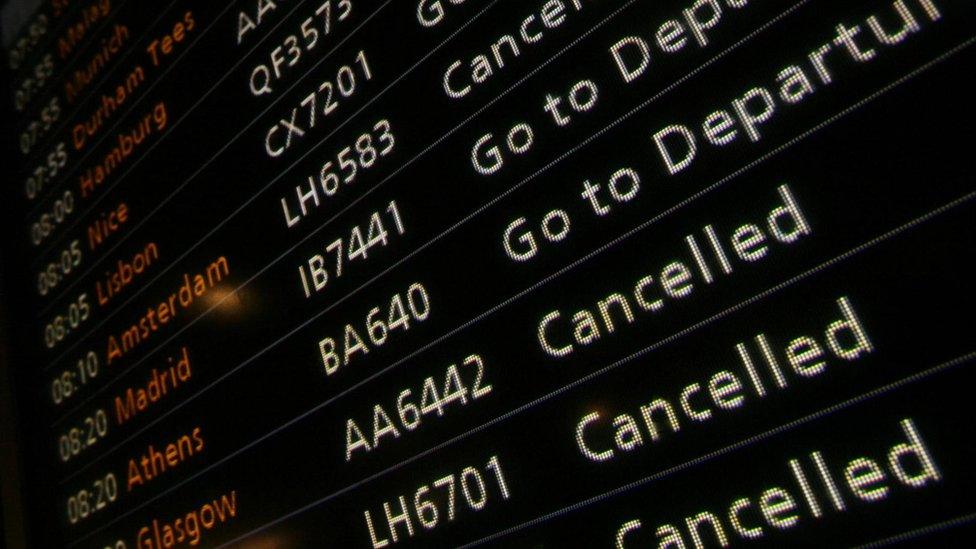
- Published2 October 2018
